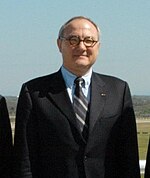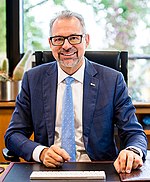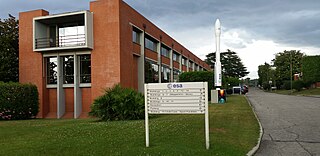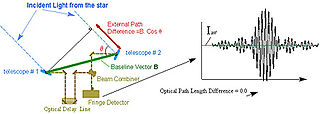
Astrometry is a branch of astronomy that involves precise measurements of the positions and movements of stars and other celestial bodies. It provides the kinematics and physical origin of the Solar System and this galaxy, the Milky Way.

The European Space Agency is an intergovernmental organisation of 22 member states dedicated to the exploration of space. Established in 1975 and headquartered in Paris, ESA has a worldwide staff of about 2,200, as of 2018, and an annual budget of about €7.08 billion, as of 2023.

The Europa rocket was an early expendable launch system of the European Launcher Development Organisation (ELDO), which was the precursor to the European Space Agency (ESA). It was developed with the aim to delivering space access technology, and more specifically to facilitate the deployment of European-wide telecommunication and meteorological satellites into orbit.

Esrange Space Center is a rocket range and research centre located about 40 kilometers east of the town of Kiruna in northern Sweden. It is a base for scientific research with high-altitude balloons, investigation of the aurora borealis, sounding rocket launches, and satellite tracking, among other things. Located 200 km north of the Arctic Circle and surrounded by a vast wilderness, its geographic location is ideal for many of these purposes.
The Swedish National Space Agency is a Government agency in Sweden operating under the Swedish Ministry of Education and Science. SNSA operates as a key component of the Swedish space programme, which is mostly carried out through international cooperation, and has included a sequence of satellite missions, both national ones and in cooperation with other nations. Furthermore, the agency distributes government grants to research and development, initiates research and development in space and remote sensing, and acts as the Swedish contact in international cooperative efforts.

The Italian Space Agency is a government agency established in 1988 to fund, regulate and coordinate space exploration activities in Italy. The agency cooperates with numerous national and international entities who are active in aerospace research and technology.

Uncrewed spaceflights to the International Space Station (ISS) are made primarily to deliver cargo, however several Russian modules have also docked to the outpost following uncrewed launches. Resupply missions typically use the Russian Progress spacecraft, European Automated Transfer Vehicles, Japanese Kounotori vehicles, and the American Dragon and Cygnus spacecraft. The primary docking system for Progress spacecraft is the automated Kurs system, with the manual TORU system as a backup. ATVs also use Kurs, however they are not equipped with TORU. The other spacecraft — the Japanese HTV, the SpaceX Dragon and the Northrop Grumman Cygnus — rendezvous with the station before being grappled using Canadarm2 and berthed at the nadir port of the Harmony or Unity module for one to two months. Progress, Cygnus and ATV can remain docked for up to six months. Under CRS phase 2, Cargo Dragon docks autonomously at IDA-2 or 3 as the case may be. As of December 2022, Progress spacecraft have flown most of the uncrewed missions to the ISS.
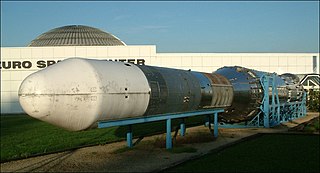
The European Launcher Development Organisation (ELDO) is a former European space research organisation. It was first developed in order to establish a satellite launch vehicle for Europe. The three-stage rocket developed was named Europa, after the mythical Greek goddess. Overall, there were 10 launches that occurred under ELDO's funding. The organisation consisted of Belgium, Britain, France, Germany, Italy, and the Netherlands. Australia was an associate member of the organisation.
The Austrian Space Agency, officially known since 2005 as the Aeronautics and Space Agency, is an organization whose purpose is to coordinate Austrian space exploration-related activities. It has been involved in both national programs and multinational efforts coordinated via the European Space Agency (ESA).
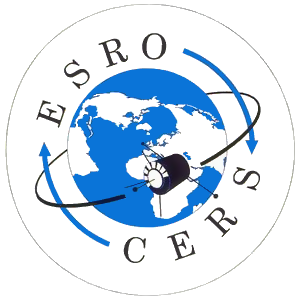
The European Space Research Organisation (ESRO) was an international organisation founded by 10 European nations with the intention of jointly pursuing scientific research in space. It was founded in 1964. As an organisation ESRO was based on a previously existing international scientific institution, CERN. The ESRO convention, the organisations founding document outlines it as an entity exclusively devoted to scientific pursuits. This was the case for most of its lifetime but in the final years before the formation of ESA, the European Space Agency, ESRO began a programme in the field of telecommunications. Consequently, ESA is not a mainly pure science focused entity but concentrates on telecommunications, earth observation and other application motivated activities. ESRO was merged with ELDO in 1975 to form the European Space Agency.

The European Space Research and Technology Centre (ESTEC) is the European Space Agency's main technology development and test centre for spacecraft and space technology. It is situated in Noordwijk, South Holland, in the western Netherlands, although several kilometers off the village but immediately linked to the most Northern district of the nearby town Katwijk.
Reimar Lüst was a German astrophysicist. He worked in European space science from its beginning, as the scientific director of the European Space Research Organisation (ESRO) from 1962 and as Director General of the European Space Agency (ESA) from 1984 until 1990.
Roy Gibson is a former Director General of ESRO, and the first Director General of ESA, serving from 1975 until 1980.

The European Space Agency (ESA) was founded in 1975 when the European Space Research Organisation (ESRO) merged with the European Launcher Development Organisation (ELDO). The ESA Convention was signed by the ESRO and ELDO members on 30 May 1975 and by Ireland on 31 December 1975. Canada signed a Cooperation Agreement on 9 December 1978. The Convention entered into force on 30 October 1980 after the ratification procedures in the 10 ESRO/ELDO members were finalised.
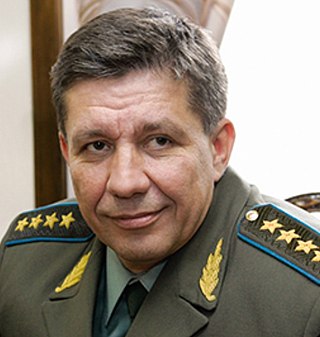
Vladimir Aleksandrovich Popovkin was a Russian statesman and military figure. He was a commander of the Russian Space Forces, then First Deputy Defense Minister of Russia, then Director of the Russian Federal Space Agency. He had the military rank of General of the Army and the federal state civilian service rank of 1st class Active State Councillor of the Russian Federation.
Henry Elliot, was a British space scientist, and Emeritus Professor of Physics, at the University of London.

The Science Programme of the European Space Agency is a long-term programme of space science and space exploration missions. Managed by the agency's Directorate of Science, The programme funds the development, launch, and operation of missions led by European space agencies and institutions through generational campaigns. Horizon 2000, the programme's first campaign, facilitated the development of eight missions between 1985 and 1995 including four "cornerstone missions" – SOHO and Cluster II, XMM-Newton, Rosetta, and Herschel. Horizon 2000 Plus, the programme's second campaign, facilitated the development of Gaia, LISA Pathfinder, and BepiColombo between 1995 and 2005. The programme's current campaign since 2005, Cosmic Vision, has so far funded the development of ten missions including three flagship missions, JUICE, Athena, and LISA. The programme's upcoming fourth campaign, Voyage 2050, is currently being drafted. Collaboration with agencies and institutions outside of Europe occasionally occur in the Science Programme, including a collaboration with NASA on Cassini–Huygens and the CNSA on SMILE.
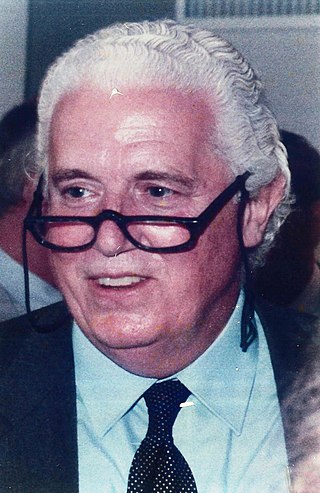
Massimo Trella was an Italian engineer, with a Master degree in mechanical and aerospace engineering, who has held numerous prestigious institutional positions in Italy and abroad in the space exploration field. He was a member of ASI, director of ESTEC and Inspector General of ESA.

